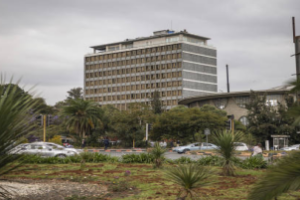
Following the coronavirus pandemic, the world’s economic performance has been in a continuous decline. Due to the grim behavior of the pandemic, the activities of many people are restricted, which in turn affected many business activities. Nevertheless, the pandemic brought opportunities for some economic sectors. In this regard, Ethiopia’s meat trade export can be taken as one subsector. The livestock meat export has shown upsurge rather than being affected by the pandemic.
The very reason that increases meat export product is the fact that the presence of the COVID-19 pandemic is significantly reducing countries’ local supply of meat products. Although importers have a desire to increase meat products from Ethiopia, as the livestock supplied to abattoirs are not fulfilling the required standard in terms of quality and quantity, the country has not been able to fully exploit the opportunity at hand.
By using modern cattle breeding systems, making the animal husbandry marketoriented, supplying all the necessary inputs as well as raising awareness of farmers, it will be possible to meet local and international demand for meat.
For this to happen, it is imperative to give special attention to the sector and cattle breeding. In so doing, the country would be able to increase its foreign currency earnings utilizing all the market access and creating additional market linkages.
With the exception of the meat export, other economic activities have been severely affected by the pandemic said Ethiopia Meat and Dairy Industry Development Institute Executive Director Haileselasse Worse. However, the major challenge that the sector faces is related to meeting quantity in terms of demand and quality standards, despite the rise in demand for meat export.
This time, Saudi Arabia and Dubai have shown interest to import meat; the director said adding that the main reason is countries such as Australia, India, Pakistan, and Brazil which previously export meat to those nations have halted meat export due to the pandemic. “That is why; Saudi Arabia and Dubai have a high desire to import additional meat from Ethiopia. However, the meat export trade has been facing challenges in terms of quality and quantity.”
In fact, following the occurrence of coronavirus in Ethiopia especially in the first weeks, the cattle market was closed. This has created anxiety among farmers and traders. However, the ministry of trade and industry made deliberations with States especially Oromia, SNNPs, and Somalia which supply 80 percent of livestock to the abattoirs.
In addition, various tasks have also been undertaken at the grassroots level in order to supply the necessary input for meat processing.
These days, seven local and international abattoirs are supplying meat. These are Luna, Organic, Modjo, Alal, Abyssinia, Elfora and Alnedju. Over the past nine months, local investors planned to earn 53.49 million USD from export and attained 82 percent of their plan. When compared the revenue with that of the same period the previous year, it has shown an increase of 1.41 million USD.
On the other hand, while foreign investors planned to earn 33.55 million USD, they have only managed to earn 11.83 million USD. This has shown a decline from the performance of last year’s same time performance, the Director said.
This time, following the upward shift in demand, the price of has shown increment as of April said the director adding, for instance, the price of one ton of meat has increased from 5,500 to 6000 USD. In a similar manner, the price of one ton of meat has increased from 6050 to 6100 USD in Saudi Arabia.
To deal with the challenges in terms of quality and quality, and make the sector effective, various tasks have been carried out with States particularly SNNP and Oromia, the director said.
The animal husbandry system has not been modernized and/or market-oriented. As it produces targeting local consumption, apart from limiting product productivity, it has limitations in terms of fulfilling the export market demand.
Ethiopia’s meat export trade could not go beyond Saudi Arabia and Dubai. In order to curb the challenges observed, livestock should be handled with necessary care so as to fulfil the criteria set by importers. For this to happen, expanding ranches, applying market-oriented cattle husbandry systems and encouraging abattoirs to have their own ranches are critical.
To bring farmers to the modern animal husbandry system, they should gain continuous assistance. “If we are working by giving special consideration to the sector, the country can gain a lot of benefit out of this untapped resource,” the director said. “At this critical time where many countries locked their doors to export meat, we have to work to improve our production to further scale up foreign currency earnings through exporting quality meat products.”
For instance, by special order, Dubai requested Ethiopia to supply 100 tons of meat via the Prime Minister Office. Accordingly, it supplied within a week. “But this doesn’t mean that we are able to deliver meat as per the demand of Dubai and Saudi Arabia. Thus, much remains to be done to further develop the sector,” Haileselasse added.
As the institute has strong relations with various stakeholders, by working closely with farmers and pastoralists committees, efforts have been carried out to supply quality livestock in sufficient quantity for abattoirs. As the sector does not require imported inputs, the income earned from meat is by far greater than other sectors, he said.
Founder and General Manager of Luna Export Abattoirs Tesfaledet Hagos also seconded the director’s comment that the demand for meat is increasing as countries who previously export meat clogged their door due to corona pandemic. As a result, the pandemic brought the opportunity to Ethiopia’s meat exporters to get market access.
“However, when we heard the first case of coronavirus in Ethiopia, there was a shortage of livestock as many merchants locked doors in fear of the pandemic. But, later on, through the continuous effort and follow-ups so far, the livestock market is now open after taking all the necessary precautionary measures. In doing so, the shortage of livestock is solved. For this to happen, the Ministry of Trade and Industry took the lion’s share.
He said working aggressively to curb challenges of cattle supply will help the country to get more benefit out of the sector. For this to happen, as they are the source of cattle; encouraging pastoralists, semi-pastoralists and unions are critically imperative. “In doing so, we can create a conducive environment so as to expand the market and promote the meat export trade,” Tesfaledet said.
“Even though human beings have been facing many challenges, as life continues, food consumption will never stop even if other things decline,” he said adding, “we have to effectively utilize the opportunities. Supplying meat products in quality and quantity will enable the country to get a significant amount of forging currency, thus, we all have to discharge our responsibilities.”
Indicating that his company slaughters up to 1500 goats per day and export 12 to 13 kilograms of meat to Saudi Arabia, he said it uses Ethiopian Cargo and passenger airplanes to export its meats products.
The Ethiopian herald June 11,2020
BY GIRMACHEW GASHAW





